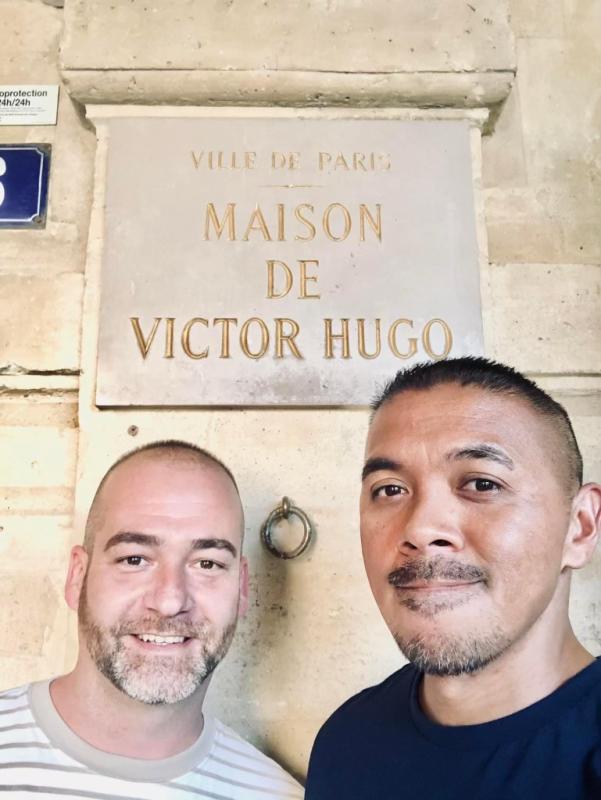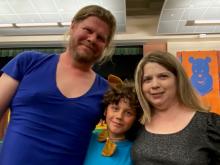The Artful Life Questionnaire: Giraud Muntz

Giraud Muntz (left) and husband Rommuelle Gatongay (right) standing in front of the Maison de Victor Hugo in Paris, France.
What we know for sure: We all have a story, and engaging with the arts helps all of us to tell our own stories on our own terms. We also know that there are ways to engage with the arts other than in formal cultural venues, and that sometimes is more about the process of art making than it is about the end product. We also know that living an artful life, which is to say, living a life in which the arts and arts engagement are a priority means different things to different people based on their own interests, their communities, and many other factors, including equitable access. The Artful Life Questionnaire celebrates the diversity of ways we can make the arts a part of our lives, and, hopefully, inspires and encourages us to live our own unique versions of an artful life. In today’s edition of the questionnaire, we’re speaking with NEA Assistant Grants Management Specialist Giraud Muntz.
NEA: Please introduce yourself. Do you have a current art practice or a way of regularly engaging with the arts?
GIRAUD MUNTZ: My name is Giraud Muntz, and I am a disabled U.S. Navy veteran and assistant grants management specialist for the Performing Arts division at the NEA. I primarily support music, opera, and the Jazz Masters Fellowship program, and help my esteemed colleagues panel and process grants for eligible applicants and non-profit organizations across the nation. I engage in and support many different art forms on a regular basis in my personal and professional life.
I studied and worked in culinary arts as a chef and manager for many years before joining the NEA. I enjoy cooking, baking, decorating, creating new recipes, fruit and vegetable carving, and ice sculpting. My husband, Rommuelle Gatongay, is a chorus singer, performer, and board member for a local non-profit arts organization. We both devote a bit of our time, energy, talents, and resources where and when we can to his chorus and supporting our talented friends in achieving their goals in their respective art form. Typically, you will find us at the theater, galas, galleries, concerts, dancing, and supporting the arts in our area and wherever we travel.
NEA: What are five words that come to mind when you think about the idea of living an artful life?
MUNTZ: Advocacy, courage, imaginative, perseverance, and subjective.
NEA: Pick just one of those words and expand on how you see it as part of living an artful life.
MUNTZ: Imaginative—I think all of the arts require an imaginative mind. An artist and their collaborators create something from their mind that is meant to convey a message, thought, feeling, or experience using their choice of, or a combination of, art forms. Whether you are part of the creative process (i.e., concept, production, exhibition) or are a supporter, patron, or benefactor, you are helping to create and promote the artist’s vision into the reality of an experience for the patrons, helping all to live an artful life, while allowing the artist to continue to practice and share their art.
NEA: Where do you currently live, and what are some of the ways that your community tells its story through the arts or through creative expression?
MUNTZ: I live in Cheltenham, Maryland, a small unincorporated community in Prince George’s County. The DMV, or District of Columbia, Maryland, and Virginia, are all within a short distance of each other and have shared many of the same residents and stories. Prince George’s County has an Arts in Public Places program that was created by county council legislation which applies at least one percent of the construction costs of certain new county civic buildings and major renovations of county civic buildings to the acquisition and installation of artwork. The program was formed to provide meaningful opportunities for artists to contribute to the development of art and culture in the county.
I also belong to another community as a disabled veteran. In this community, the arts are a big part of the healing process and allow veterans to tell their story through different artforms and mediums in the company of kin (other veterans). There is a wide range and combination of disabilities that come from military service, some are visible and some are not. I love seeing both active-duty service members' and fellow disabled veterans’ art and productions at the Veterans Affairs facility as well as my local military treatment facility.
NEA: How do you think that living an artful life can improve the well-being of your community?
MUNTZ: I feel that as a society, we live in an artful world but do not always live an artful life. It is easy to overlook the meaningful things around you, especially those you experience every day, and not give a second thought into the meaning or profoundness of the experience—recreating them as a form of art, or at the very least promoting their artfulness. Living an artful life helps to bring a different perspective as well as exposes you to the stories of those around you. The creation, display, and exposure to the arts can lead to discussions, inspiration, hope, healing, storytelling, entertainment, and ultimately can bring a community together.
NEA: Is there a particular place in your neighborhood that is a creative touchstone for you?
MUNTZ: While I would love to say that there is a specific place in my neighborhood that is a creative touchstone, I cannot. Every day, I see something new and interesting that I have not noticed before that can spark new, fun, and interesting creative inspiration.
NEA: What’s your favorite informal way or space to engage with arts and culture?
MUNTZ: Karaoke! I have visited karaoke facilities around the world and am always amazed to see a place where people get up and sing whatever song is in their heart or on their mind, interpreting popular songs with their vocal abilities. Given, there are some that have more practice and talent than others, but for many this is their grand stage and artful moment. I also enjoy music festivals and live bands. By visiting local street fairs and art vendors on my journeys, I get to sample the music, culture, food, and an array of arts and artists that are typically unique to that area. My husband and I have also purchased works from local artists in many places we have visited around the world.
NEA: If you didn't work in the arts, do you think the arts would still be a part of your life?
MUNTZ: Yes, the arts have always been a big part of my life, and my love and passion for the arts is a big reason why I applied to work at the NEA.
NEA: Can you share an arts experience or moment of arts engagement that has had an identifiable impact on your life?
MUNTZ: My elementary school music field trip to my first symphony orchestra in New York City, as part of the school curriculum, was quite impactful to my life. My only exposure to string instruments prior to the trip were our school concerts. I remember the lights going down and the sound of the music filling the room, and I felt the music in my chest and my emotions started to swell. My teacher looked at me and said, “It is ok. You are not the first, nor will you be the last, to have that reaction. You are witnessing years of hard work and dedication, with enough practice that could be you someday.” That day had a profound impact on my appreciation of music and the arts.





